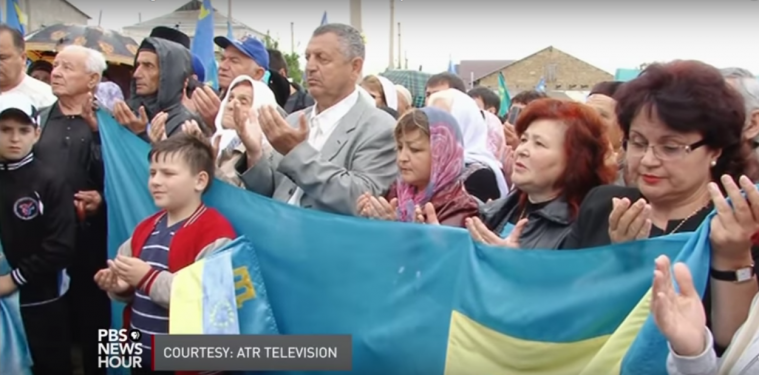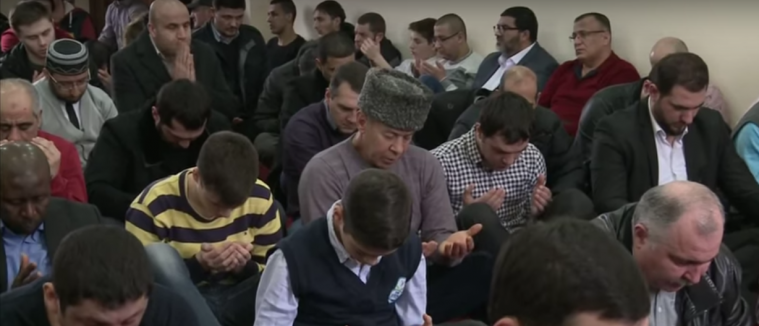Ukraine’s Crimean Tatar Muslims have persevered through centuries of persecution, including an alleged Soviet-sponsored genocide in 1944. With Russia’s 2014 annexation of the Crimea, the Tatars are now facing renewed persecution in the form of government crackdowns and forced exile. Special correspondent Kira Kay reports in partnership with the Bureau for International Reporting.
HARI SREENIVASAN: It’s been more than two years since Russia invaded the Ukrainian territory of Crimea, home to a Muslim population that has suffered greatly through the centuries. Since the invasion, they are under pressure once more.
From Kiev, special correspondent Kira Kay reports, our story produced in partnership with the Bureau for International Reporting.
KIRA KAY: Here in the main mosque of Ukraine’s capital, Kiev, Imam Seram Arifov leads Friday prayers for the city’s Muslims, but he is more than 500 miles from his home in Simferopol, Crimea.
IMAM SERAM ARIFOV, Kyiv Islamic Cultural Center (through interpreter): I was a teacher. We had a private school. We were teaching the Islamic religious sciences. We also taught the Koran. I had to leave my homeland to continue my job in more acceptable conditions. We could not work in Crimea anymore. They didn’t let the school operate. They didn’t renew our license.
KIRA KAY: “They” are the Russians, who invaded and annexed Crimea in march 2014. The imam and about 100 members of the congregation are Crimean Tatars, a small Muslim community with centuries of history in the region.
But many found themselves on the wrong side of the new authorities, and now they have, in effect, become refugees in their own country. This young mother is one of them.
WOMAN (through interpreter): I had to quit my studies. I was studying there in high school, but I had to grab my documents and come here. All our loved ones are still in Crimea. We are far away from our parents. And it’s difficult to be away from our homeland.
KIRA KAY: Protests in Ukraine led to the ouster of pro-Russian President Viktor Yanukovych in early 2014, but Russia, unhappy with the loss of Yanukovych, took advantage of the turmoil, reclaiming territory it considered its own.
A referendum was held in March 2014. Russian authorities say 96 percent of Crimean voters supported the annexation.
But Refat Chubarov, the political leader of the Crimean Tatars, believes many Crimean residents were too intimidated by the heavy presence of Russian troops to express their true feelings.
REFAT CHUBAROV, Chairman, The Mejlis of the Crimean Tatar People (through translator): The only ones who spoke out openly against such a fake referendum were Crimean Tatars. We understood that Crimea faced a new problem, a terrible one. Moscow never came to Crimea with good intentions.
KIRA KAY: The Crimean Tatars already had a long history of conflict with Russia, going back even before the Soviet Union. Then, during World War II, nearly the entire population was forcefully deported thousands of miles away by communist dictator Joseph Stalin. Ukraine says more than 100,000 people died in what it considers a genocide.
That history resurfaced dramatically last week, when a Ukrainian woman of Crimean Tatar descent won a Pan-European sing contest watched by tens of millions. Her winning song memorialized the 1944 deportation of the Tatars. Only after the Soviet Union dissolved in the 1990s and Ukraine became its own country did the bulk of Crimea’s Tatars return, with the hopes of starting over.
Gulnara Izetovna’s family resettled and had just finished building their new house. But after the referendum, Gulnara was stopped by authorities when returning from a trip.
GULNARA IZETOVNA (through interpreter): They asked about my nationality. I was accused of separatism and they interrogated me.
KIRA KAY: Izetovna fled, as have an estimated 30,000 other Crimean Tatars.
GULNARA IZETOVNA (through interpreter): Living now in the 21st century, I never thought that this could happen again. What my parents felt during World War II is the same thing I feel now.
KIRA KAY: Ukraine is an overwhelmingly Christian country. The Orthodox Church plays a strong role in life here. But the annexation of Crimea, and the Russian support of separatists in the east of the country, has created a shared enemy and made Ukraine more welcoming of thousands of Muslim refugees than some other parts of Europe.
Still, it has been a difficult process, says aid worker Enver Bekirov.
ENVER BEKIROV (through interpreter): There were many large families of Crimean Tatars, families with sick people, disabled people. We just decided to take the responsibility.
KIRA KAY: Bekirov ensures the displaced have proper clothing and food, and helps them find housing that various refugee agencies also pay for.
When Lenie Bilial fled Crimea, she was pregnant with her sixth child. She and her husband, Mustafa, had wanted to stay in Crimea, but felt repressed because of their faith.
MUSTAFA BILIAL (through interpreter): We are Muslims, and this is very important to us. What is happening in Russia, we see that Muslims are being persecuted. They come and break into these educational establishments. They include certain literature on the blacklist. I worry, for example, the Koran or other books might end up on the list.
KIRA KAY: Today, they feel welcomed by their new neighbors, but also not fully at home.
Back in Crimea, Russian authorities are now intensifying their crackdown on the Tatars, arresting activists and community leaders by using anti-extremist laws. Others have been abducted, including this man, who was filmed being taken by a pro-Russian militia and was later found dead with signs of torture.
The Crimean Tatars’ governing body, the Mejlis, has been banned. They are now functioning in exile. Leader Refat Chubarov has himself been indicted by Crimean prosecutors for violating Russia’s territorial integrity by continuing to insist Crimea is part of Ukraine.
GEOFFREY PYATT, U.S. Ambassador to Ukraine: This is a moderate Muslim community that was victimized once before under Stalin and is now being victimized under the Russian occupation of Crimea.
KIRA KAY: Geoffrey Pyatt is the American ambassador to Ukraine. The U.S. has sanctions against Russia because of the Crimean annexation. Pyatt says that amidst the diplomatic pressure and war of words, Crimea’s Tatars shouldn’t be overshadowed.
GEOFFREY PYATT: Crimea is not going to be returned to Ukrainian sovereignty over the short-term. And the Tatar community understands that. To have a community like the Tatars, which is notably tolerant, notably inclusive, makes it even more important that we not allow their story to be forgotten.
KIRA KAY: Recently, Crimean Tatars have taken dramatic steps to make sure they aren’t forgotten. Last year, they created a blockade of the roads leading from Ukraine into Crimea, jamming an economic lifeline.
And activists believed to include Crimean Tatars blew up the power lines still serving Crimea, plunging the peninsula into darkness for weeks. But most Crimean Tatars acknowledge they won’t be going home any time soon, including journalist Osman Pashayev, who had been detained while covering commemorations of the historic deportation.
So, he and his entire news staff also went into exile. Their small operation keeps the flow of free information, both for the community in exile and those back home.
OSMAN PASHAYEV, Editor, ATR Television (through interpreter): We’re looking something to keep that connection. We have to be relevant to our audience, and we must avoid that the annexation becomes permanent.
KIRA KAY: But with every passing day, that connection may become harder to keep.
Source: PBS




